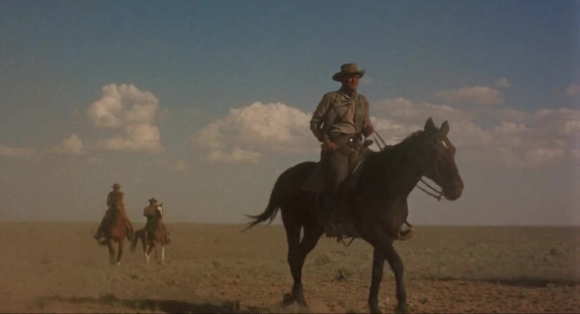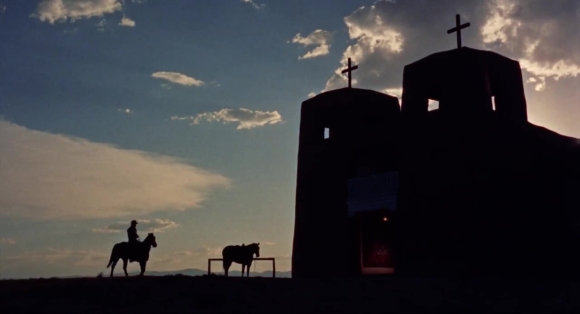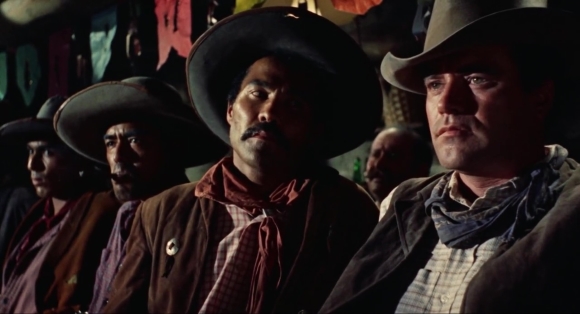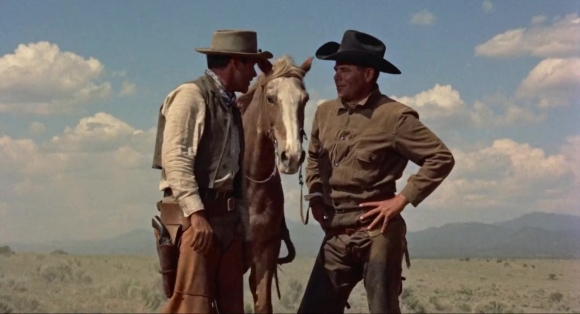“You’re a dreaming idiot, and that’s the worst kind. You know what the trail is really like? Dust storms all day, cloudbursts all night. A man has got to be a fool to want that kind of life. And all that hogwash about horses! The loyalty of the horse! The intelligence of the horse! The intelligence? You know a horse has a brain just about the size of a walnut. They’re mean, they’re treacherous and they’re stupid. There isn’t a horse born that had enough sense to move away from a hot fire. No sensible man loves a horse. He tolerates the filthy animal only because riding is better than walking…. Pour me a little more whiskey there, will you?”
The myth, and how to deconstruct it. Those lines above, quoted by Glenn Ford’s world-weary trail boss as he lies in a hot bath he’s traveled the length of the country for, drinking whiskey from a china cup and shooting cockroaches off the wall, seem to rip the romantic facade away from the genre. We’re looking at a man who is bone tired, more than a little jaded and in no mood to indulge the highfalutin fantasies of Jack Lemmon’s lovesick hotel clerk. Delmer Daves’ Cowboy (1958) therefore creates the impression that the movie is going to dispense with legends and instead print some mean and ugly truths. In a way it does too, at least in the sense that the kind codology Ford holds forth against gets short shrift, and for long stretches it looks as though the whole thing is building towards a grim revision of the genre. Nevertheless, the deeper myth, that which informs and elevates the western movie is, unsurprisingly, what Daves was searching for and what he skillfully reaffirms by the end.
The structure is classically circular, starting and ending in what what is nominally the same place, creating the impression of a tale turning back on itself but finishing up on a very different level as far as the development of the characters is concerned. The story is seen through the eyes of Frank Harris (Jack Lemmon), an ambitious young man first encountered working in a hotel in Chicago. This is not where he intends to spend the rest of his life though and the fact he has fallen for a young Mexican woman and incurred the displeasure of her father is one of the factor’s influencing his plans. When the expansive and free spending Tom Reese (Glenn Ford) and his rambunctious cowhands book into the establishment, this sets Harris thinking and a run of rotten luck at the card table for the trail boss provides an opportunity worth seizing. In short, Harris makes Reese a loan of his savings to get him out of trouble in return for a partnership on the upcoming cattle drive, one which will conveniently take him all the way to Mexico. What follows is a classic trail story, one beset by difficulties posed not only by the hardships of the terrain and the hazards of the Comanche, but also by those stemming from the personalities and idiosyncrasies of one’s traveling companions. This site often looks at westerns underpinned by the theme of redemption but here it’s not so much that aspect that grounds the film as those near relatives: growth and renewal.
Cowboy is based on an autobiographical work by Frank Harris called My Reminiscences as a Cowboy. Born on the west coast of Ireland in Galway, Harris went on to lead what might reasonably be termed a colorful life, traveling throughout the United States and Europe and earning fame or notoriety (depending as ever on one’s point of view) in the process. He certainly wouldn’t be the first writer who is alleged to have added some embellishment to his experiences so it is hard to say how accurate the source of what is presented on screen is. That notwithstanding, Cowboy, with its script by Edmund H North and and an uncredited and still blacklisted Dalton Trumbo, tells a rattling good yarn with plenty of incident, all of which is predicated on a solid core message.
Every time I come back to a movie directed by Delmer Daves I’m once again struck by his focus on the better aspects of human nature. I see this as the defining characteristic of his work, that simple faith in humanity and its capacity for rising above the petty and the ignoble, and that perspective forms a large part of what draws me back to his films regularly. As was mentioned above, the redemption motif is not present in the movie as it doesn’t feature characters who have wandered down the kinds of paths that require a trip to that destination. What we do get are men who have either lost touch with or have yet to attain a fully rounded appreciation of humanity. So growth and renewal are the dominant themes, which I regard as a welcome detour. Daves was always very much at home shooting outdoors and he makes fine use of the Arizona and New Mexico locations, beautifully photographed by Charles Lawton Jr and with a fine George Duning score to complement the imagery.
For a long stretch it appears as though the plot is going to chart a hard bitten course, Harris soon has the exuberance knocked out of him by the unforgiving nature of both the environment and his companions. The whole purpose of his trek across the border is shattered in one moment of appalling revelation, a moment which threatens to tip him into a pit of despair and bitterness that is deep and steep sided. Similarly, Reese spends much of his time indulging his cynicism and abrasiveness. To all intents and purposes, that dismissive diatribe quoted at the head of this piece starts to sound more and more like a summation of the myth-busting stall the film has set out. Yet it’s a deceptive impression, for the characters played by Lemmon and Ford respectively learn and grow as a result of their experiences and their effect on each other. Lemmon had a knack for essaying a unique type of passion and enthusiasm that often felt manic and brittle. He comes perilously close to cracking under the strain and the provocations that come his way, but he matures in the process and tempers his excesses in a way that transforms them into strengths. Ford’s destination is slightly different, but just as fulfilling for the character and the viewer too. His path is essentially one of rediscovery and renewal, the bluster and machismo discarded as he witnesses the negativity of his influence mirrored in the meanness that threatens to harden the heart and damn the soul of his youthful partner. In support Brian Donlevy plays it quiet and pensive in a way that he didn’t always get the chance to, a disillusioned gunslinger looking for a different kind of life. There’s something very moving about his ultimate fate, and it proves to be one of the prime catalysts spurring Ford’s epiphany. Anna Kashfi (Marlon Brando’s first wife) is the only woman in a very masculine movie and although her role is important for its impact on Harris in particular, she’s only in the film for a short time. Richard Jaeckel, Dick York, Frank DeKova and Strother Martin are among those who also provide telling little sketches that serve to flesh out the story.
Cowboy is a fine Delmer Daves western, perhaps weakened somewhat by the lack of a more positive female character of the type that bolstered and added depth to his very best movies. Still, there’s much to admire in what we do get, visually, thematically and in the work of the principal cast members.
With this post I have now managed to cover all of the westerns directed by Delmer Daves. He’s a filmmaker whose work I never weary of sampling whatever the genre and his movies have been regularly featured here over the years. Below are links to all of his westerns that I have posted about.






Great job, well done. And covering all of Daves’ westerns makes for great reading. Been far too long since I’ve seen this one – completely forgot Donleavy was in this one in fact! Will remedy this – what disc do you own?
LikeLiked by 1 person
I still have the old Sony DVD. I need to get round to upgrading to HD, but, sadly, there always seems to be something else demanding my money. Donlevy turns in a lovely thoughtful bit of work in support.
LikeLike
Turns out I don’t have a copy (hard to believe but ….) so just ordered the DVD!
LikeLike
Hope you like it. It doesn’t get the attention of some of the director’s other westerns but it’s a nicely crafted picture in my opinion.
LikeLike
I saw it several times in Italian way back when, be great to see it again.
LikeLiked by 1 person
A quick bit of searching around suggests it popped up on TV more regularly than I seem to recall. I guess the memory plays tricks.
LikeLike
COWBOY was one of the first Blu Ray’s I purchased along with 3 10 TO YUMA on a French imprint that included an interview with Daves’ son split over the two discs. The p.q. on both discs was stellar and well worth the upgrade. Totally agree with Donlevy’s performance who was taking “rent roles” at the time-just shows what a World Class director can make regarding an actor’s performance.
LikeLike
I like Donlevy as a rule – I know some are not keen on his take on Quatermass, but it works for me. He tended to get cast as brash and/or snappish types, which he played very well, so this change of pace is most enjoyable.
LikeLike
I liked Donlevy a lot as Quatermass. In fact I like him more than the other actors who’ve played the role.
LikeLiked by 1 person
Excellent review. Still need to check this one out as I really like Daves’ other Westerns. I still find that a good DVD suffices watching a movie in a pinch.
LikeLike
Yes indeed, Chris. Much as I like Blu-rays, I have no issue with decent DVDs. Most of what I have in my collection is DVD after all.
LikeLiked by 1 person
Sometimes I’m astonished by the quality of a well done DVD. I become lost in the movie and just enjoy it even not being HD.
LikeLiked by 1 person
Lemmon could do it all – and very well – Comedy, Romance, Drama …. I guess he wanted to try at Action and Western. This completed his resume.
Good job Colin.
LikeLiked by 1 person
Yes, I guess the fact he became so closely associated with comedic roles during his peak years means he’s known mainly for that and leads many to think he did nothing much else. He was a good dramatic performer though and anyway I’m of the opinion that effective comic actors need to have well developed dramatic skills.
LikeLiked by 1 person
For me, Lemmon began well with It Should Happen To You, his first schnook part, and by the end of the decade came TheA partment, an interesting film and a despicable attack on American society. After that, Jack and Walter worked well for me, but Jack alone? never.
LikeLike
I generally avoid movies in which Jack Lemmon appears. He just irritates me so much. One of the most wildly overrated actors in history.
LikeLiked by 1 person
Bingo.
LikeLike
Ditto. But, I thought he was terrific and perfectly cast in IRMA LA DOUCE (1963).
LikeLike
Good Grief!! Of course you’re entitled to what you like – or not, but Lemmon was great Actor and had a great career. Politics?? The only politics that were ever evident to me were The China Syndrome. Otherwise …
LikeLike
Now The China Syndrome really was a spectacularly awful movie. With three spectacularly awful lead performances. A reminder that although there were some great movies made in the 70s there were some real stinkers as well.
LikeLiked by 2 people
I agree that the three leads in China Syndrome were wanting, but the supporting people, were fine, and I am especially fond of Scott Brady in just about anything.
LikeLiked by 1 person
An opinion not shared by very many. But I’m glad I stirred the pot.
LikeLike
One of my favorite Lemmon roles is ‘Glengarry Glen Ross’. He was incredible in that among so many other great actors.
LikeLike
I agree. That’s one of those stories that sound as though it is going to be profoundly non-cinematic yet it translates so well to the screen. I remember it held me rapt throughout the first time I saw it. The confinement, the small cast, the desperation and merciless filleting of rotten business practice is so well realized.
LikeLike
I heartily agree. You put it so well what I find fascinating about that great film.
LikeLiked by 1 person
Jack divides opinion everywhere but he won the heart of Felicia Farr.
I enjoyed seeing buddy Walter in the sack with lovely Felicia in CHARLEY VARRICK…now there’s a movie!
LikeLike
I like Lemmon though I remember David Thomson’s cutting comment in his film dictionary, ‘A little Lemmon goes a long way.’ Harsh! I agree about Varrick which is a great, great movie.
LikeLike
Each to their own, but I’ve always enjoyed Lemmon. I don’t think I’ve seen a movie of his that I didn’t enjoy on some level. Even the lesser ones didn’t suffer from his presence.
LikeLike
I agree. Another great moment of his is the monologue he gives to his son in Altman’s ‘Short Cuts’. Great acting there. For goodness sake he did ‘Some like it Hot’ and ‘The Apartment’! You get to go to great actor Heaven then with those two alone.
LikeLike
That’s broadly how I feel too, Chris. Playing the lead in some of the finest Hollywood movies of the 20th century has to mean something. Naturally, not everybody will be as taken with certain performances or movies but one can’t deny the artistry involved.
LikeLike
I know it’s a very unpopular opinion but I detested Some Like It Hot. Billy Wilder made some superb movies but comedy was not his forte. His comedies come across to me as nasty and mean-spirited, and painfully unfunny.
Of course all of Billy Wilder’s movies are nasty and mean-spirited but in movies like Sunset Boulevard, Ace in the Hole and Double Indemnity that is absolutely the right approach and it’s part of what makes those films masterpieces.
LikeLike
Congrats Colin on finally covering every Delmer Daves western 🙂 I am a huge fan of his work 🙂 His westerns are fantastic as well and Cowboy is no exception 🙂 You know one thing that I have noticed when it comes to Daves westerns (or at least among his biggest fans), it is either 3:10 to Yuma or Jubal that get singled out as his number one greatest western 🙂
LikeLiked by 1 person
John, I think it’s fair that those two movies should command attention and respect, they are strong works and deserve to be lauded. Personally, I think those two as well as The Last Wagon and The Hanging Tree constitute a formidable core to his western output, with the latter in particular folding in an especially attractive and articulate synthesis of the themes that permeate and characterize his body of work.
LikeLiked by 1 person
Watching ‘The Hanging Tree’ on the new Blu was really impressive. Really striking film and one of Daves’ best.
LikeLiked by 1 person
I remember being very pleased when the DVD came out looking good and in the correct aspect ratio. However, I subsequently bought the Blu-ray and I agree that it’s a worthwhile upgrade.
LikeLike